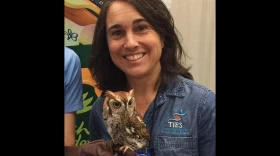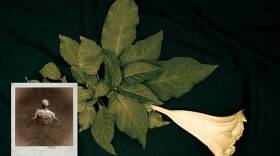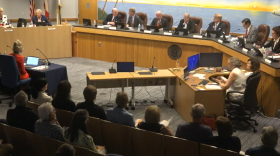-
Beth Macy's latest book is Paper Girl, which explores the deep divisions in the U.S. It was recently nominated for a National Book Critics Circle Award. Her book Dopesick was made into an Emmy-winning series on Hulu.
-
Dr. Raymond DePaulo began as a student at the Johns Hopkins University School of Medicine in 1968 and went on to become an M.D. in 1972 and then did his residencies there. He founded the Affective Disorder Clinic in 1977 and these days he’s co-director of the Johns Hopkins Mood Disorders Center. He was on the Florida Gulf Coast University campus to give a talk for the university’s Provost’s Seminar Series so stopped by the studio for a conversation about his work and career and the changes he’s seen over the past 58 years. He also spoke with the Naples Discussion Group while he was in town.
-
Amyotrophic lateral sclerosis (ALS) is a rare, progressive, and fatal neuromuscular disease for which there is currently no known cure. It typically manifests in mid-to-late adulthood and progresses rapidly with a median survival time of two to five years, though it can sometimes progress faster. It's currently diagnosed through a long process that can often take well over a year. We learn about a new technique developed at the nonprofit Brain Chemistry Labs in Jackson, Wyoming that can diagnose ALS with a simple blood test with 97% accuracy.
-
Multi-award-winning Blues musician, songwriter, painter, and craftsman James “Super Chikan” Johnson visited Florida Gulf Coast University this past spring to speak to students and make a couple of performances at Artis-Naples. During his visit he stopped by the WGCU studios for conversation about his life’s journey through music, his handcrafted instruments made from recycled parts, and how he got his stage name.
-
We hear from the Florida Health Professionals for Scientific Integrity. It is a group of healthcare workers who are concerned about trends in public health in Florida, particularly the end of vaccine mandates in schools.
-
The Center for Inquiry was founded in 1976 by the likes of Carl Sagan and Isaac Asimov to investigate what they called ‘extraordinary claims’ being made about things like paranormal activity and UFO abductions — things that fall into the category of pseudoscience. We talk with the center's Director of Education, Bertha Vazquez, about the work she does and the role of science in our lives, and the crucial need for a skeptical mind in the face of information overload.
-
Long form journalism and deep dive investigative reporting on local issues have historically been the domain of local newspapers. But as newsrooms have shrunk, gaps have been created — and a new model for local journalism has emerged in response: nonprofit newsrooms, mostly comprised of reporters who once worked for newspapers and other forms of commercial media. We meet the Executive Editor-in Chief of Suncoast Searchlight which focuses on Sarasota, Manatee, and DeSoto Counties to get a sense of their origin story and mission — and reflect on the state of local news that’s led to the rise of these online, nonprofit news organizations.
-
The Wasmer Art Gallery at FGCU is hosting an exhibition of works by multidisciplinary artist Onajide Shabaka titled “Becoming Tomorrow’s Dream.” Shabaka’s work is deeply rooted in historical, cultural, and ecological narratives often exploring themes related to the African diaspora, collective memory, history, anthropology, and ethnobotany. We will talk with Shabaka about the exhibit and his broader artistic practice ahead of his artist talk, Jan. 22, at the exhibit’s opening reception.
-
Daniyal Mueenuddin’s new book This is Where the Serpent Lives draws from feudal society in Pakistan, in the country and the city.
-
Ahead of the Feb. 3, 2026, Naples City Council election, the League of Women Voters of Collier Council organized a candidate forum for all eight candidates seeking three open seats on the council. We’ll hear a condensed broadcast of the forum moderated by Naples Daily News Executive Editor Wendy Fullerton Powell and WGCU’s John Davis.
Play Live Radio
Next Up:
0:00
0:00
Available On Air Stations










